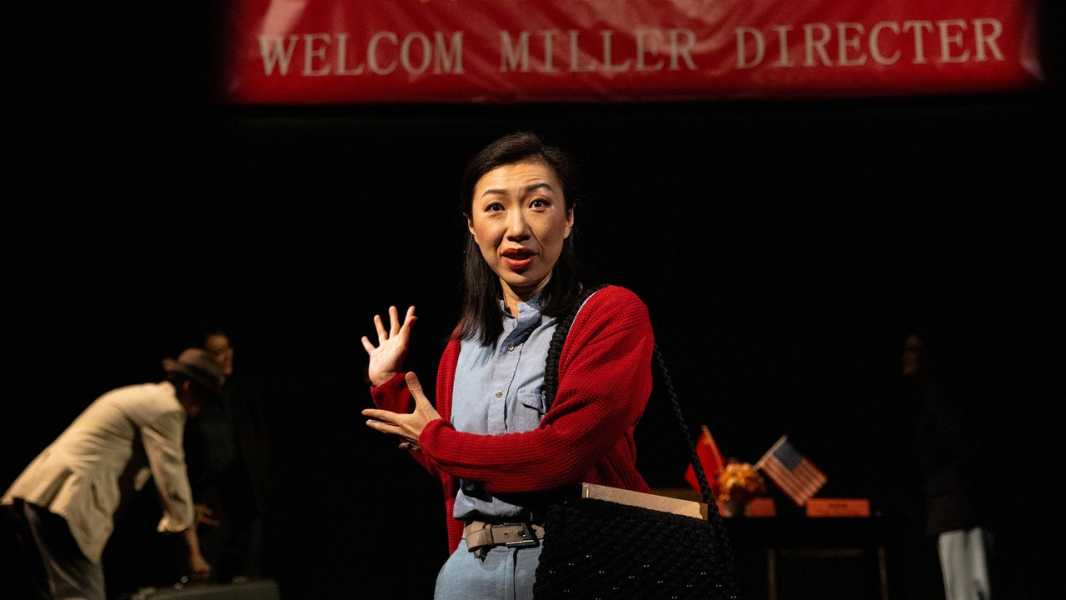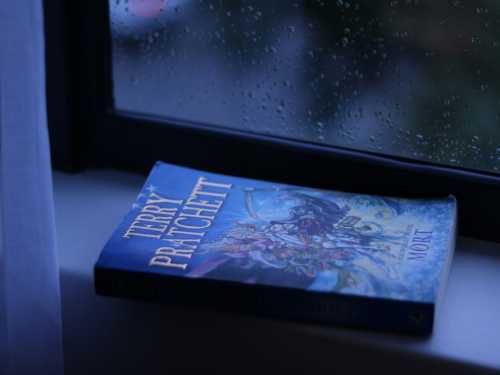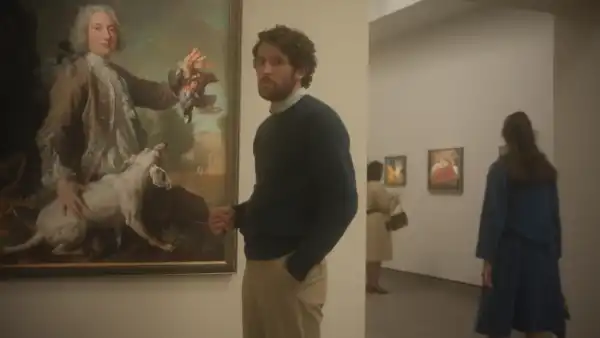
Save this storySave this storySave this storySave this story
In March, 1983, Arthur Miller arrived in Beijing to direct a Chinese staging of “Death of a Salesman” at the Beijing People’s Art Theatre. Opening night was six weeks away and his thoughts were crowded with technical and ideological uncertainties. Beijing Renyi, as the People’s Theatre was popularly known, was the country’s most prestigious modern-drama institution, but, all the same, sound effects and music had to be produced with a decades-old East German tape recorder, the set designer was obliged to make a cardboard box stand in for a refrigerator, and the lights would go dim during daytime rehearsals, because the whole city’s voltage dropped when factories were in operation. Miller, who did not speak any Chinese, would be entirely reliant on an interpreter as he directed, and he worried, too, about what else might be lost in translation: could a society long removed from commercial life make sense of a man like Willy Loman, whose dreams and crises were so bound up in nineteen-forties American materialism?
The encounter between Miller and the members of Beijing Renyi is the subject of a new play at the Connelly Theatre, in the East Village, “Salesman之死,” by Jeremy Tiang. As the title hints—pronounced “Salesman zhīsǐ,” it simply means “death of a salesman”—the play flows bilingually back and forth between Mandarin and English. It is surtitled in both languages, and all the roles, including that of Miller himself, are played by a cast of six Asian women, five of whom are Chinese-speaking immigrants. Often making use of Miller’s book about the episode—“Salesman in Beijing”—the play dramatizes the misunderstandings and sudden connections of the rehearsal process, weaving them into a larger consideration of the distances and intimacies between the two countries and cultures.
Miller had been curious about the Chinese Revolution for years. In 1973, he wrote to the Chinese Premier Zhou Enlai pleading for a visa but got no response. Finally, in the fall of 1978, two years after the death of Mao Zedong, the Chinese People’s Association for Friendship with Foreign Countries brought Miller to China for a visit of several weeks. During the visit, Miller met with various Chinese dramatists and directors, including the playwright Cao Yu, who was also the head of Beijing Renyi, and the famous actor-director Ying Ruocheng. The two of them later invited him to come back and direct “Salesman.” Meanwhile, Miller’s wife, the Magnum photographer Inge Morath, who had been studying Chinese for years, set about recording what she saw on film. The country she photographed had only just emerged from the Cultural Revolution, and its quotidian realities were almost unknown to the outside world. As he watched her at work, Miller noted, “The ability to be surprised is a virtue.” “Salesman之死” finds humor in such cross-cultural surprises. When one character explains the concept of life-insurance policies—“people get money for dying”—another nods and says, “Oh, like revolutionary martyrs!”
Tiang, who was born in Singapore, developed the play alongside its director, Michael Leibenluft, who speaks Chinese and has directed plays in China. For the central character of their play, they picked not Miller but rather his interpreter, a twentysomething academic named Shen Huihui. Shen had written her graduate thesis on Arthur Miller and was a rising star at Peking University when she was approached by Ying, the actor-director Miller had met on his previous visit. Ying, now best known in the West for an appearance in Bernardo Bertolucci’s “The Last Emperor,” played Willy Loman in the Beijing production and translated the text. He was ensconced in China’s intellectual élite. His father was a famous educator and his paternal grandfather had married into the Qing royal family and founded a newspaper, Ta Kung Pao, that is still in circulation. Ying had read “Death of a Salesman” in December, 1949, the same year it premièred in America, and just weeks after the People’s Republic of China was founded. For most of his life, performing it in China would have been an impossibility. In Tiang’s play, Ying is exasperated when Shen, worried about neglecting her academic work, hesitates to take on the task of interpreting for Miller. The project “will clear a path for us to step out into the world,” he says. “Do you know how many decades I’ve been waiting for the chance?”
For decades before the Communists came to power, modern realist drama had flourished in China. Cao Yu, whom Miller met in 1978, was one of its star playwrights. But, after the Cultural Revolution began, in 1966, Beijing Renyi’s rehearsal rooms were repurposed to house hundreds of Red Guards, and Cao went from being a cultural gatekeeper to an actual one—charged with directing cars to park in an alley by the theatre that he’d previously managed. In a courtyard nearby, another of the theatre’s most famous dramatists, Lao She, was taunted and abused by a group of Red Guards, and later found dead. In 1968, Ying and his wife were imprisoned, and later they were exiled to a reëducation center in the countryside, working on a rice farm. As it happened, Jiang Qing, Mao’s powerful wife, was a former actress, and she promoted eight so-called model plays, which used the traditional forms of Beijing opera to convey revolutionary messages. Characters in such plays were either good or bad—there was no room for such a thing as a conflicted inner life.
Miller’s experiences with the House Un-American Activities Committee surely helped him relate to what his Beijing cast had been through. (In 1957, a congressman from Ohio had asked him, “Why do you write so sadly?”) During rehearsals Miller patiently worked with the actors to find common ground between their vastly different experiences. Ying, playing Willy Loman, found it hard to understand the character’s delusional behaviors, as when he holds out hope for a business loan even after his son Biff has told him that it won’t happen. Miller asked the actors to search their own lives for situations that they could neither bear nor adapt to, leaving self-deceiving hope as the only way forward. Ying laughed, immediately seeing the point. “It’s as Chinese as hell,” he said. “It’s our whole history.”
Away from the rehearsal room, Miller and Morath took hours-long bike rides around town. “The tourist mind presses attention outward, but living in a place lets things in,” Miller wrote. They saw a city “intimate with itself”: in open spaces, men played checkers games and grandmas beat quilts. Miller and Morath could see early signs of Deng Xiaoping’s market reforms. To counter youth unemployment, the government had begun to encourage small businesses. On the street, skilled laborers repaired bikes and made furniture. The atmosphere made Miller think of the tenements of the Lower East Side, the world in which his immigrant father had been a young man—“the philosophers congregating on the stoops, the future gangsters and judges and songwriters yelling across the areaways.”
Part of Miller’s struggle was to situate the 1983 production in a place that felt specific, without being necessarily Chinese or American. Early on, he was startled to find his cast in whiteface, wearing light-colored wigs, walking with an exaggeratedly “Western” gait. “Act yourself,” he urged them. Tiang’s play often teases out the issues of identity latent in such moments. At one point, Ying’s wife, a literary translator, refers to the author Bette Bao Lord, famous in the eighties for her best-selling novel “Spring Moon,” as being “both Chinese and American, if such a thing is possible.” What makes the line so striking is not just that a cultural fusion so unthinkable to a nineteen-eighties Beijinger (and probably to many nineteen-eighties Americans) is now commonplace. More than that, the entire production with its cross-cultural, multinational, multilingual cast, writer, and director exists in this previously unimaginable hybrid space.
There is a kind of cultural vertigo involved in seeing how deftly the actresses transform themselves as they switch between roles, or as they represent Chinese people representing Americans. Some of the mannerisms are unmistakably old Beijing: a working-class man spreading his legs and cursing, a cadre tapping his mug of tea when he’s impatient. At other times, it feels as if nationality has almost evaporated. When Biff, wearing a baseball cap, exclaims in a perfect Beijing accent, “Pop, I’m nothing! I’m nothing, Pop! Can’t you understand that?,” there is no sense of splintered identity, only a young person, put down by the world. He’s angry at suffocating parental expectations but, at the same time, pained by his anger. The moment is a kind of fruition of Miller’s own aspiration to create “something not quite American or Chinese but a pure style springing from the heart of the play itself—the play as a nonnational event, that is, a human circumstance.”
Miller’s show in Beijing was a success. People applauded ceaselessly. Lingering viewers missed the last bus. One professor walked eleven miles back home so he could ponder more. Miller soon left China, but the production ran for some fifty performances. As for Shen, the reluctant interpreter, toward the end of “Salesman之死,” we learn that she was so transformed by the experience that she decided to go to the U.S. as a visiting scholar. “The door is open,” she says. “I don’t know when it will shut again, but right now, I can walk through it.” Ying, a mentor figure by now, encourages her, borrowing the line that Willy often says to Biff—“the door of your life is wide open.”
Shen is now in her late sixties and lives in Vancouver, and Tiang and Leibenluft interviewed her while developing the play. The play ends with projected footage of her speaking and, because she is speaking mostly Mandarin, the cast members take it in turns to translate what she says—the interpreter herself interpreted. The thing that stuck in Shen’s mind, she says, was not the triumph of the production or the famous people she met, but a quiet moment one night, after rehearsal. It was nine or ten, and she took the tram to Chang’an Street, in downtown Beijing. The street lamps emitted a warm light. “It felt as if everyone was resting, and I was the only one still at work, doing something very meaningful,” she says. “I was the chosen one.” As the six actresses translate her story, the projection of Shen blankets the stage. She smiles and nods, as if passing on the blessing Ying gave her forty years ago to the six actresses, younger versions of herself. ♦
Sourse: newyorker.com






